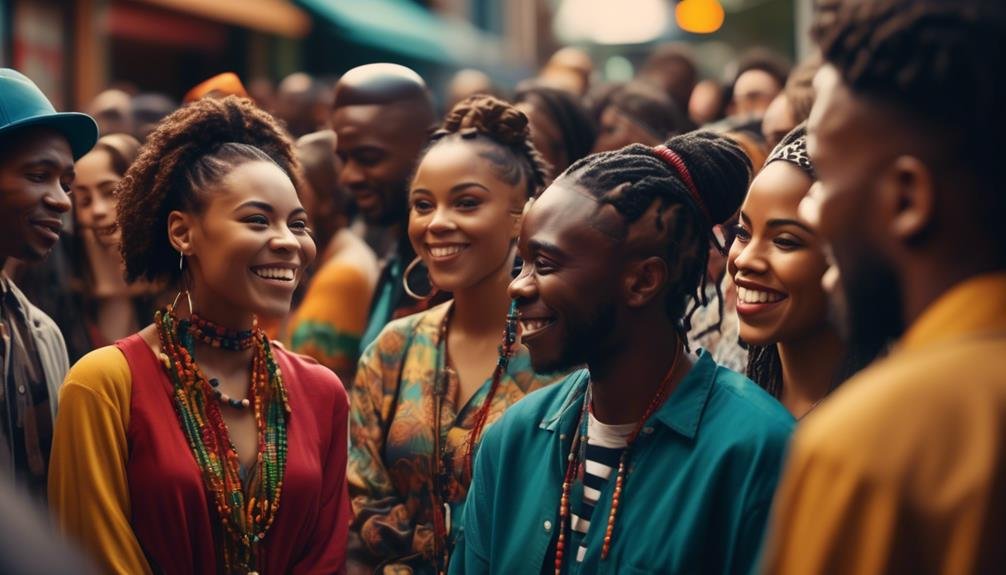Understanding and Valuing Multicultural Competencies
Multicultural competencies have become increasingly important in today's globalized world. As societies become more diverse and interconnected, understanding and valuing different cultures and perspectives has become essential.
However, simply acknowledging the importance of multicultural competencies is not enough; it is crucial to actively develop and cultivate these skills.
In this discussion, we will explore the benefits of developing multicultural competencies, the role of cultural awareness and sensitivity, effective communication across cultures, strategies for building these competencies, and the role of education in fostering inclusivity and equity.
By delving into these topics, we will gain a deeper understanding of why multicultural competencies are not only valuable but also necessary for personal and professional growth.
Key Takeaways
- Multicultural competencies are crucial for promoting inclusivity, understanding, and cooperation in a globalized society.
- Developing multicultural skills enhances cultural awareness, communication abilities, and problem-solving skills.
- Cultural awareness fosters empathy, analytical thinking, and the ability to navigate cultural nuances.
- Actively seeking opportunities to engage with individuals from different cultures and continuously educating oneself on various cultures are effective strategies for developing multicultural competencies.
Importance of Multicultural Competencies
Understanding the importance of multicultural competencies is crucial in today's diverse and interconnected world. Multicultural competencies refer to the knowledge, skills, and attitudes necessary to effectively interact with individuals from different cultural backgrounds. In a globalized society, where people from various cultures, ethnicities, and religions interact on a daily basis, having multicultural competencies is essential for fostering inclusivity, understanding, and cooperation.
One of the key benefits of multiculturalism is its ability to promote social cohesion and harmony. When individuals are equipped with multicultural competencies, they can navigate cultural differences, appreciate diversity, and build positive relationships with individuals from different backgrounds. This leads to the creation of inclusive communities, where everyone feels valued and respected.
However, developing multicultural competencies is not without its challenges. One of the main challenges is overcoming biases and stereotypes. Unconscious biases can hinder effective communication and prevent individuals from truly understanding and appreciating the perspectives of others. Overcoming these biases requires self-reflection, empathy, and a willingness to challenge preconceived notions.
Another challenge is the constant need for learning and adaptation. Cultures are dynamic and ever-evolving, and staying informed about cultural norms, values, and practices requires continuous education and open-mindedness. Developing multicultural competencies involves ongoing self-education, attending cultural competency trainings, and actively seeking out opportunities for cross-cultural interactions.
Benefits of Developing Multicultural Skills
Developing multicultural skills offers numerous benefits in today's diverse society.
Cultural awareness allows individuals to gain a deeper understanding and appreciation of different perspectives, values, and traditions.
By enhancing communication skills, individuals can effectively bridge cultural gaps, foster empathy, and build stronger relationships with people from various backgrounds.
Developing multicultural skills not only promotes inclusivity and equality but also contributes to personal growth and professional success in an increasingly globalized world.
Importance of Cultural Awareness
Cultural awareness plays a vital role in fostering a more inclusive, empathetic, and analytical approach to multicultural skills development. Developing cultural competency training and cultural intelligence development can bring numerous benefits, including:
- Enhanced empathy: Cultural awareness allows individuals to understand and appreciate the experiences, perspectives, and values of people from different backgrounds. This empathy helps build stronger connections and collaboration across diverse groups.
- Improved communication: Cultural awareness enables individuals to navigate cultural nuances and adapt their communication styles accordingly. This leads to more effective and respectful interactions, reducing misunderstandings and conflicts.
- Increased analytical skills: Cultural awareness encourages individuals to critically analyze their own biases and assumptions, promoting a more objective and informed decision-making process. This analytical approach helps identify and address systemic inequities and biases in a multicultural context.
Enhancing Communication Skills
Building upon the importance of cultural awareness, developing multicultural skills can significantly enhance communication abilities in a diverse and interconnected world. Effective communication across cultures requires a deep understanding of the values, beliefs, and customs of different societies. By developing intercultural understanding, individuals can navigate the complexities of cross-cultural collaboration with empathy and respect.
Enhancing communication skills in a multicultural context can lead to various benefits, such as:
| Benefits of Developing Multicultural Skills |
|---|
| Increased cultural sensitivity and awareness |
| Improved ability to adapt communication styles |
| Enhanced cross-cultural collaboration |
| Reduced misunderstandings and conflicts |
| Strengthened relationships and trust |
Cultural Awareness and Sensitivity
How can individuals cultivate a deep understanding and appreciation for different cultures in order to foster a more inclusive and respectful society?
Cultural awareness and sensitivity are essential components of developing cultural competence and promoting intercultural communication. Here are three ways individuals can enhance their cultural awareness and sensitivity:
- Education: Individuals can take the initiative to educate themselves about different cultures by reading books, attending cultural events, or taking online courses. This will help them gain knowledge and insights into the values, traditions, and customs of different cultures, facilitating a deeper understanding and appreciation.
- Open-mindedness: It is crucial to approach interactions with people from different cultures with an open mind and a willingness to listen and learn. By suspending judgment and being receptive to new perspectives, individuals can create a safe space for intercultural dialogue and build meaningful connections.
- Empathy: Developing empathy is vital for cultural awareness and sensitivity. By putting themselves in others' shoes and trying to understand their experiences, emotions, and challenges, individuals can build bridges of understanding and foster a more inclusive and respectful society.
Effective Communication Across Cultures
To effectively communicate across cultures, individuals must develop a nuanced understanding of cultural differences and adapt their communication styles accordingly. Intercultural understanding is the foundation of effective cross-cultural communication. It involves recognizing and appreciating the diverse values, beliefs, norms, and behaviors of different cultural groups. By possessing this understanding, individuals can navigate cultural differences and communicate in a way that is respectful, inclusive, and effective.
Effective cross-cultural communication requires individuals to be empathetic and open-minded. They need to be able to put themselves in the shoes of others and understand how their cultural background may influence their communication style. This understanding allows individuals to avoid making assumptions or generalizations and instead approach communication with curiosity and respect. It also enables them to adapt their communication style to match the cultural norms and expectations of the other person or group.
Analytical skills are also crucial in effective cross-cultural communication. Individuals need to be able to observe and interpret nonverbal cues, such as body language and facial expressions, which may vary across cultures. They should also be attentive to language nuances, as certain words or phrases may have different meanings in different cultures. By being analytical, individuals can avoid misunderstandings and build stronger connections with people from diverse cultural backgrounds.
Navigating Cultural Differences in the Workplace
Navigating the complexities of cultural differences in the workplace requires a deep understanding of diverse perspectives and a commitment to fostering inclusive and collaborative environments. Cultural intelligence plays a crucial role in successfully managing cultural conflicts and promoting a harmonious work atmosphere.
Here are three key strategies to navigate cultural differences in the workplace:
- Developing Cultural Intelligence: Cultural intelligence refers to the ability to understand and adapt to different cultural norms, values, and behaviors. By actively seeking knowledge about other cultures, engaging in cultural experiences, and embracing diversity, individuals can develop their cultural intelligence. This helps build bridges between team members from different cultural backgrounds and encourages mutual understanding and respect.
- Promoting Open Communication: Effective communication is essential for navigating cultural differences. Encouraging open dialogue and creating a safe space where employees feel comfortable sharing their perspectives and experiences can help mitigate misunderstandings and foster inclusivity. Active listening, empathy, and practicing cultural humility are key components of promoting open communication.
- Building Team Collaboration: Collaborative teamwork can bridge cultural gaps and enhance productivity. Encouraging teamwork and creating opportunities for diverse team members to work together on projects can foster cross-cultural understanding and appreciation. Emphasizing shared goals and values while celebrating cultural diversity can strengthen team bonds and create a cohesive and inclusive work environment.
Strategies for Building Multicultural Competencies
Building multicultural competencies is essential for fostering inclusivity and understanding in diverse workplaces.
Cultural sensitivity training helps employees develop an awareness of their own cultural biases and gain insights into the experiences of others.
Additionally, honing cross-cultural communication skills enables individuals to effectively navigate differences, foster collaboration, and promote a harmonious work environment.
Cultural Sensitivity Training
In order to effectively develop multicultural competencies, organizations can implement cultural sensitivity training as a strategic approach. Cultural sensitivity training is a valuable tool that helps individuals and organizations understand and respect diverse cultures, fostering an inclusive and harmonious work environment.
Here are three key benefits of cultural sensitivity training:
- Enhanced Cultural Competency: Cultural sensitivity training equips participants with the knowledge and skills needed to interact with people from different backgrounds. It promotes understanding and empathy, allowing individuals to navigate cultural differences with respect and sensitivity.
- Improved Communication: Cultural sensitivity training enhances communication by providing insights into cultural norms, values, and communication styles. This enables individuals to adapt their communication strategies to be more inclusive and effective when engaging with diverse audiences.
- Increased Diversity and Inclusion: Cultural sensitivity training helps organizations create an inclusive and welcoming environment for all employees. By fostering understanding and appreciation for diverse cultures, it encourages diverse perspectives, boosts employee morale, and attracts a wider talent pool.
Cross-Cultural Communication Skills
Developing cross-cultural communication skills is essential for building multicultural competencies within organizations. In today's globalized world, intercultural understanding and effective global communication are vital for successful collaboration and growth.
To enhance cross-cultural communication skills, individuals must first recognize and appreciate cultural differences. This involves actively seeking to understand diverse perspectives and respecting different communication styles. Additionally, developing empathy and open-mindedness can foster better intercultural understanding.
To assist organizations in developing these skills, the following strategies can be implemented:
| Strategies for Building Cross-Cultural Communication Skills |
|---|
| 1. Provide intercultural training and workshops |
| 2. Encourage the use of interpreters or translators |
| 3. Foster an inclusive and diverse work environment |
| 4. Promote active listening and effective questioning |
| 5. Encourage frequent feedback and reflection |
The Role of Education in Developing Multicultural Competencies
Education plays a pivotal role in fostering the development of multicultural competencies, equipping individuals with the necessary knowledge, skills, and attitudes to navigate and thrive in diverse and interconnected societies.
In order to effectively develop these competencies, several key factors must be considered:
- The Role of Teachers: Teachers are instrumental in shaping students' understanding of and appreciation for different cultures. They play a crucial role in creating a classroom environment that celebrates diversity, promotes inclusivity, and encourages open dialogue. By incorporating multicultural perspectives into their teaching practices, teachers can help students develop empathy, critical thinking skills, and a sense of social responsibility.
- Multicultural Curriculum: A well-designed multicultural curriculum is essential for promoting multicultural competencies. It should include diverse literature, historical narratives from different cultures, and opportunities for students to engage in cross-cultural exchanges. By exposing students to a variety of perspectives and experiences, a multicultural curriculum helps them develop a broader understanding of the world and fosters respect for different cultural identities.
- Intercultural Experiences: Education should provide opportunities for students to engage in meaningful intercultural experiences. This can include field trips to cultural institutions, community service projects, and partnerships with schools in different cultural communities. By engaging in direct interactions with individuals from different backgrounds, students can develop a deeper appreciation for diversity and strengthen their multicultural competencies.
Promoting Inclusivity and Equity Through Multicultural Competencies
Promoting inclusivity and equity is essential for building a society that values and respects the diverse experiences and identities of its members. In today's multicultural world, it is crucial to create an environment where everyone feels included and can thrive. This requires implementing inclusivity initiatives that recognize and address the unique needs and perspectives of individuals from different backgrounds.
Multicultural competencies play a crucial role in promoting inclusivity and equity. These competencies enable individuals and organizations to understand, appreciate, and effectively navigate multicultural team dynamics. By developing these competencies, individuals can cultivate empathy, cultural sensitivity, and the ability to communicate and collaborate across diverse backgrounds.
Inclusivity initiatives can take various forms, ranging from creating diverse hiring practices to fostering inclusive work environments. For instance, organizations can implement diversity training programs that provide employees with the necessary tools and knowledge to work effectively in multicultural teams.
Additionally, promoting inclusivity and equity can involve creating policies that address systemic barriers and biases, ensuring that all individuals have equal opportunities for growth and success.
Conclusion
In conclusion, developing multicultural competencies is essential for fostering inclusivity and equity in our increasingly diverse society.
Just as a skilled artist blends different colors to create a beautiful painting, individuals with multicultural skills can navigate cultural differences and effectively communicate across cultures.
By valuing and understanding diverse perspectives, we can create a harmonious and enriching environment where everyone feels valued and respected.
Education plays a vital role in cultivating these competencies, and by embracing multiculturalism, we can create a more inclusive and empathetic world.







